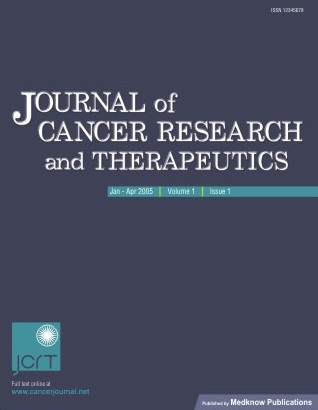
|
Journal of Cancer Research and Therapeutics
Medknow Publications on behalf of the Association of Radiation Oncologists of India (AROI)
ISSN: 0973-1482 EISSN: 1998-4138
Vol. 1, Num. 1, 2005, pp. 7-8
|
Journal of Cancer Research and Therapeutics, Vol. 1, No. 1, January-March, 2005, pp. 7-8
Editorial
Radiation therapy for the developing countries
Bhadrasain Vikram
Section of Applied Radiation Biology and Radiotherapy, International Atomic Energy Agency, Wagramer Strasse 5, A-1400 Vienna
Correspondence Address:Head - Section of Applied Radiation Biology
and Radiotherapy, International Atomic Energy Agency, PO Box 100, Wagramer
Strasse 5, A-1400 Vienna.
b.vikram@iaea.org
Code Number: cr05003
The global burden of cancer is increasing very rapidly in the developing countries. According to WHO/IARC projections, by the year 2015 there will be 15 million new cancer patients in the world each year, of whom 10 million will be in the developing countries. Ensuring that those patients receive appropriate treatment is a major challenge.
In 1999 a WHO consultation determined that "together with surgery, radiotherapy currently remains the most cost-effective way of curing cancer", and "radiotherapy is an essential component of modern health care" [Clinical Oncology 11:368-370, 1999]. In well-developed countries today, just over one-half of the cancer patients require radiotherapy [Acta Oncologica 42:416-429, 2003]. In developing countries, however, an even greater proportion require radiotherapy due to the location and relatively advanced stages at presentation of many common cancers, which precludes adequate treatment by surgery alone.
It is estimated that during the 20-year period between 2005-2025, 100 million cancer victims in the developing countries will require radiotherapy, for cure or the relief of symptoms such as pain and bleeding. Sadly, only 20-25% of patients in developing countries that need radiotherapy can access it today, and the situation will only worsen in the future unless steps are taken to address it.
Addressing this need for radiotherapy in the developing Member States (MS) is a high priority for the IAEA. A significant part of this is accomplished through IAEA′s Technical Cooperation program, under which assistance is provided to dozens of MS for establishing or upgrading facilities for cancer treatment, but only upon request by the goverments. Radiotherapy (with telecobalt and brachytherapy, together with simulation, immobilization and computerized treatment planning) can be a very cost-effective form of treatment. The cost per patient can be further minimized by extending the working hours by employing an adequate number of well-trained staff.
Lack of well-trained staff results in underutilization or inappropriate
utilization of even the existing scarce radiotherapy facilities in many
countries. Therefore, fellowships for initial education and training are
provided by the IAEA, as well as continuing professional development activities
for professionals (physicians, technicians, nurses, physicists, maintenance
engineers, etc.) in radiation oncology and allied fields, in response to
requests from the governments of about 100 MS.
Another reason for the sub-optimal
utilization of the existing facilities is the lack of a quality culture
in many institutions. Machine down-time is high in many developing country
institutions due to lack of preventive maintenance. There have been instances
when Co60 sources with a very low out put have been used, thus negating
any meaningful treatment. Underdose due to an unreasonable fear of complications,
and overdose due to lack of awareness, is not unknown. Many IAEA activities,
therefore, focus on establishing and/or strengthening quality assurance
programs, such as comprehensive clinical quality audits.
In addition, links have been established or strengthened for cooperation
with many other governmental and non-governmental organizations, such as
the WHO, IARC, the International network for cancer treatment and research
(INCTR), the European society for therapeutic radiology and oncology (ESTRO)
the American society for therapeutic radiology and oncology (ASTRO), and
the National cancer institute (NCI) of the USA. For instance, during several
national and regional training courses on cancer treatment sponsored by
the IAEA, the WHO′s country liaison officers are invited to join the faculty and described WHO′s cancer control activities in the country/region to the participants. In several countries, as a part of the establishment/upgrading of radiotherapy, IAEA sponsors a cancer registrar (usually the first in that country) for training by IARC. ESTRO, INCTR, etc. contribute teachers and/or teaching materials for many educational activities of the IAEA.
These activities are underpinned by the establishment of standards, guidelines,
syllabuses and curricula, as well as the critical assessment of new technologies
in the fields of radiotherapy and oncology. Last but not least are the
research and development activities, aimed mainly at developing ′resource-sparing′ but scientifically robust protocols, for the treatment in resource-constrained environments of those cancers that are very common in the developing MS.
It is crucial that developing countries should evolve their own evidence-based
guidelines. For example, chemo-radiation of solid tumours in the nutritionally
deprived patient may not accrue the same level of benefit as seen in the
literature from affluent countries. Accelerated fractionation or hypofractionation
may improve outcomes, or decrease the expense, or both, in many clinical
situations. Clinical trials conducted in developing countries can most
appropriately address these important questions in a scientifically robust
manner. Ideas for such studies are always welcome, even from individuals.
Poverty in a relatively affluent society might mean limits on choices but
in the developing countries it can be literally a matter of life or death.
Cancer combined with poverty throws up challenges quite different from
the ones seen in affluent societies. Clinical investigators from developing
countries are the key to appropriately addressing those challenges, by
the rational utilization of radiotherapy and allied technologies - both
new and old.
Copyright 2005 - Journal of Cancer Research and Therapeutics
|
